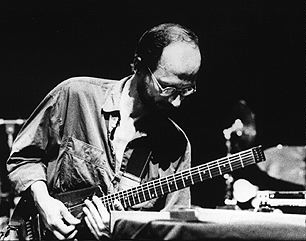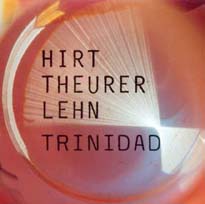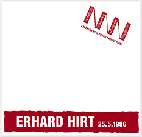

Courtesy of Erhard
Hirt
Photo by Raymond Malentier

happy few records

Nurnitchnur
A FIRESIDE
CHAT WITH ERHARD HIRT
From
a train, Erhard Hirt, one of the finest free formed improvisers on any
instrument let alone guitar, answered the questions I posed to him. More
and more, like the trombone, I am deepening my appreciation of the guitar.
Although, Wes Montgomery and Joe Pass still seem to bore me (must be a
generational thing), Derek Bailey, Marc Ribot, Bill Frisell, Thurston
Moore, and Hirt peak my interests. But Hirt and Bailey in particular are
too much. I am still trying to absorb Hirt's Trinidad recording and I
received that from Hirt over two months ago. I am honored to present Mr.
Erhard Hirt, unedited and in his own words.
FRED JUNG: Let's start from the beginning.
ERHARD HIRT: When I started to play music, we where three friends at school
no dancers, no sportsmen, no motor cycleriders but loved rock
music. So we picked up instruments and tried to follow our stars (Cream
and Jimi Hendrix) making terrible noise at the first dance school party.
Getting more practice and under the influence from groups like Soft Machine
and listening to the music of John Coltrane, we developed to become the
local avant-garde jazz-rock group in the '70s. Although improvising was
an important aspect of rock music of that time, first contact with free
jazz came through the activities of Wuppertal free jazz heroes, Peter
Brötzmann and Peter Kowald.
FJ: Was the guitar your first instrument of choice?
ERHARD HIRT: Yes, it was. I picked up the guitar in the Sixties being
influenced by the British blues movement. I was very much inspired from
that horn like long note guitar players like Peter Green and Eric
Clapton but soon found recordings from screaming Otis Rush, elegant B.B.
King and (later) powerful Freddie King.
FJ: It is a daunting task to keep an audience's interest during a solo
concert, is
there increased pressure when you perform alone? If so, why do it?
ERHARD HIRT: There are two aspects about solo concerts. The absence of
musical partners, which you usually interact with first, creates a uninterrupted
connection to the public. Group improvising logically first creates an
communication circle in between the musicians and gives the public the
invitation to join the musical process. To work alone seems to be a bit
more pressure than in a group because all the inspiration could come out
of yourself. But on the other hand, it gives the chance to formulate personal
ideas and concepts, which will be changed and alternated in group settings,
often, very soon. So solo work becomes a kind of mixture between real
improvising and conceptional music. I remember, doing my first solo record
in 1982, I liked the situations: "to finalize own musical ideas."
FJ: How did your work with blues bands help your improvising?
ERHARD HIRT: I love the blues guitar, the very individual style of guitar
players and blues singers (but I hate German blues revival, making most
bands sound like the others). The difference to improvised music is that
you work with a given form and not have to develop that musical form.
But in good blues music, like in many other ethnic music or jazz music,
the form seems to be less important than the expression. The few cords
and the floating harmonic-melodic relations of blues gave a lot of space
for improvising. So it gives the chance and the challenge - even if you
play the same song each night - to make it a new one every time going
beyond the point you played last time.
FJ: You formed a string quintet in the early Eighties, what was the catalyst
for such a venture?
ERHARD HIRT: The string quintet was a totally improvising group. I very
much liked the colour of string sounds and the extended way the members
of the group where using the possibilities of their instruments. Probably
the main idea in that group was to create an alternative sound to the
jazzy sounding sax and drums area of improvised music.
FJ: What was the musical climate like in Europe during the late Seventies
and early Eighties?
ERHARD HIRT: There were a lot of music coops going on, little festivals
and a climate of aufbruch. It was great for me to get in contact to Paul
Lytton and Paul Lovens. I got the chance to work regular with Paul Lytton
who was with his duo with Evan Parker one of my heroes that
time. When I moved to the city of Münster, we founded the Initiative
Improvisierte Musik Münster (I.I.M.) with four drummers and
one guitar player (!) - in 1981 and also arranged concerts and event.
FJ: Was that climate condusive to your brand of improvised music?
ERHARD HIRT: Yes, it was. I think in the Seventies improvised music emancipated
from American free jazz and established its own European style.
FJ: Would your life have been easier if you played bebop instead?
ERHARD HIRT: No, I don¹t think so because I cannot play bebop. I
never had the idea of getting an easy way in making music.
FJ: Is jazz, as history books documented, dead?
ERHARD HIRT: A question for feature pages or jazz critics. I don't think
so much about categories doing music. I still find myself on jazz events,
but I am not sure to be a real jazz player. What I like in the tradition
of jazz are the very strong individual musicians with their own personal
style. The more establishing of jazz - for example to be teached in universities
- has also an aspect to make it to a kind of historic music. But on the
other hand, I see a lot of young musicians who don't think about these
categories. They can get a very good musical training now, playing new
music scores, improvising or learn something about other music cultures.
FJ: Why are European improvisers being looked at for the advancement of
this music more so than their American counterparts now?
ERHARD HIRT: I really believe that in improvised music which was
of course very much influenced from the freedom of American black music
from the Sixties the European musicians found their own styles,
combining the individual personal attitude of jazz with their own tradition
of their European musical history and European new music. If they really
looked serious for their own way in music they there bound to do so.
FJ: In the King Übu Örchestrü, what were the dynamics of
the group and why did you part ways?
ERHARD HIRT: The King Übu Örchestrü was based on a quartet
of Wolfgang Fuchs (reeds), Paul Lytton (percussion, live-electronics),
Hans Schneider (double bass) and myself, which was named Xpact. The orchestra
founded in 1984 included most of the European musicians (from Italy, Swiss,
Great Britain and Germany) I was working with that time. One of the ideas
was being able to listen to everybody in a complex musical structure -
without the concept of having soloists and background roles in the ensemble.
This created a very flexible and sensitive structure, which became typical
for that band. The band combined different characters of players and I
think after some changes in the line up we found a well balanced musical
collective of ten players able to do improvised real time music in live
concert situations. I left that band in '87 because of conceptional differences
with co-organizer Wolfgang Fuchs.
Fred Jung is Jazz Weekly's Editor-In-Chief and part of the triple threat
of the Lakers. Email him.